

By Michael Wells
Looking over what I’ve written for this site so far, I notice that most of it is Japan-related. This surprises me, since, tragically trendy fellow that I am, I’ve concentrated largely on Hong Kong cinema until fairly recently. But the gratifying fact is that Japanese movies are suddenly hot again. There are even whispers of another Golden Age to follow the previous one of the ‘50s and ‘60s. Since I started paying attention to movies with subtitles a good number of years ago, the conventional wisdom has been that the industry never really recovered from the harrowing collapse of the old-fashioned studio system in the ‘70s. I don’t hear anybody saying that lately. The “Japanese Cinema Now” mini-retrospective at the Film Society of Lincoln Center (February 21-28, 2002) did and didn’t justify the renewed enthusiasm: most of the films were interesting and enjoyable to one degree or another, but… well, I am wont to get my expectations up too high, and in this case only one movie exceeded them.
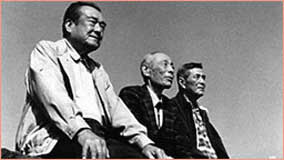
My schizoid feeling about the series finds a nice microcosm in Not Forgotten (2000) and its abrupt transition from the good to the stupefying. Makoto Shinozaki’s warm, affecting generational drama focuses on four aging buddies still haunted by their World War II combat experiences together. The narrative runs on two tracks for a while. The first consists of episodic slices of life about romance, illness, marital and family relations, survivor guilt, etc. The second is a slow-to-boil subplot about a cultish company that preaches concern for the elderly while preying on their pocketbooks through manipulation and psychological abuse. The tracks look like they’re heading for a smooth merge until they collide like a train wreck in a miscalculated ending that seems to have stumbled in from another genre. Shinozaki most effectively makes his points about the neglected and dishonored older generation simply through the engaging presence of his lead actors. Their luxuriously lined faces and shimmering silver hair, towering on the screen, reminded me again how much the cinema misses out on due to its obsession with youth in all its smooth, glossy blandness.
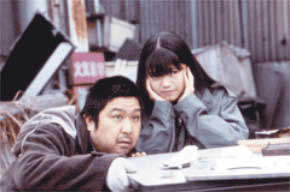
A slice of life carved out with a rusty, jagged blade, Harmful Insect (’01) takes an even more melancholy look at a lost generation, but from the other end of the telescope. Director Akihiko Shiota heaps the tribulations of Job upon his 13-year-old heroine: absent father, suicidal mother, the unwelcome attentions of a pigpen full of middle-aged men, and vicious classmates eager to use all these things against her. Her tug o’ war between redemption and self-destruction is presented in the poker-faced, long-take minimalism that’s as much a convention of Japanese art films as hyperactive editing is of American action films. To the extent that I could tell, this is a well-wrought and effective, if not earthshaking, example with a more than passing resemblance to the same year’s lost youth saga All About Lily Chou-Chou. To be honest, though, I was terribly distracted by the tinny blaring of some moron’s headphones throughout the movie. Seriously. And if I ever find out who this motherfucker is, I will hunt him or her down and strangle him or her, if I have to sell all my earthly belongings and travel to another continent to do it. I could write a whole essay on the disappearance of audience etiquette and if you keep watching this space, I just might.
Ahem.
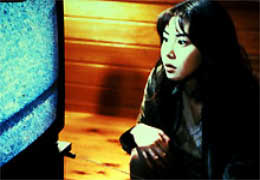
If the generation gap is a major motif in current Nipponese film, an even more important one is gooseflesh. Two of the most acclaimed exemplars of the J-horror wave were included, Ring and Pulse. Based on a novel by best-selling genre author Koji Suzuki, Ring (’98) was the blockbuster that spawned the trend, as well as two mutually exclusive sequels, a prequel, two TV series, a Korean remake, Ring Virus and of course the hit American film (still on the drawing board at the time of this fest). Finally seeing it for myself after years of hype, I was surprised at how minor it felt. The acting is stiff, the visual and narrative rhythms strictly TV movie stuff and half the screenplay consumed by expository chatter. What powers the Ring phenomenon is an irresistible urban legend premise (creepy VHS cassette of mysterious origins brings death to all who watch it) and a handful of iconic, sleep-disrupting images. The classic Japanese ghost story figure of a robed woman draped in long, raven hair is updated chillingly with grainy video. I confess to sleeping with a lamp on that night in spite of my critical reservations.
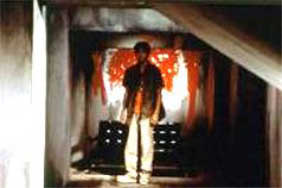
Ring’s imagery has heavily informed a number of successors, not least of them Kiyoshi Kurosawa’s much-heralded Pulse (’01), in which ghosts manifest via Internet rather than videotape. “Should have been called Ring 3,” more than one viewer has carped. But the differences are as telling as the similarities. Kurosawa in his sleep can conjure atmosphere better than Ring’s Hideo Nakata, and the first half is clammy and sepulchral. But where Ring’s plot is built on a mystery structure, Pulse’s second half dissolves in typical Kurosawa fashion into arty vagueness. It’s never less than intriguing, but my eagerly primed nerves felt cheated after the earlier hints of terror. The rather heavy-handed metaphors about modern humanity’s loneliness and “disconnection” (nudge, nudge) aren’t much of a substitute. Most admirers take the abandonment of traditional horror structures as proof that Kurosawa is doing something exalted. But I sometimes suspect that he simply can’t be bothered with the heavy lifting of story construction and character development. It’s amusing to speculate on the development meetings for the rumored American remake, which at one point had, of all people, Wes Craven attached.

Then again, Pulse looks like, oh, Scream compared to Kurosawa’s Barren Illusion (’99). (Yes, the guy got two movies, or almost a third of the series.) Beginning as a collaboration between KK and his film school students, Barren is a virtual avant garde feature with the feel of having been constructed “Exquisite Corpse” style. It seems to be set in the very near future, amid barely discernible hints of totalitarianism and environmental catastrophe. It seems to be about a young couple and the ups and downs of their life together. Sometimes the guy seems to fade from the screen for no discernible reason. Lots of things seem to happen for no discernible reason. I seemed to glance at my watch a lot. I felt like I should have been mesmerized, but I never got there – it wasn’t visually striking enough to hold my eye, too vaguely conceived to stimulate me intellectually, too affectless to engage me emotionally. “That’s how to make a science fiction movie!” enthused the guy next to me after the lights came up. Hm. It’s also how to make studied, academic nonsense, the cinematic equivalent of lima beans. I walked out hungry for some good junk food.
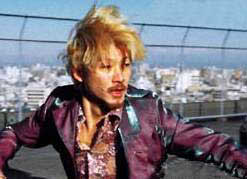
I got my wish. Oh, my, yes. Yes, indeedy, I did. It’s difficult to know what to say about Takashi Miike’s Ichi the Killer (’01). So allow me to start with, “Iiiiiieeeeaaaaaagggghh!!!” And I mean that as a compliment, mostly. Even if you’re familiar with the work of this high priest of extreme cinema, you might not be prepared for his flabbergasting adaptation of the comic book by Hideo Yamamoto (also, oddly enough, the name of the movie’s unrelated but very gifted cinematographer). An albino, scarfaced, S&M hitman who dresses kinda like Prince would be enough for most movies. But the aforementioned gentleman isn’t even the title character: Ichi himself is a sexually deranged, razor-booted, kickboxing crybaby-superhero who usually snaps into action when he’s carnally aroused. The synapse-frying grossness of their adventures in dismemberment, torture and sexual assault had the packed house shrieking aloud, and if shock value were all Ichi had to offer, I probably would have exited well before the end, something I almost never do. But surfing atop the tsunami of gore and cum are a crackling action/thriller, a queasily riveting Freudian psychodrama with real emotional resonance and an immensely witty black comedy with supporting characters who deserve their own movies. Grisly cinema usually falls into one of two categories: disarmingly cartoonish or genuinely disturbing. Ichi encompasses both. It’s the most electrifying film I would ever warn most people away from, and nobody who dismisses it in revulsion will get much argument from me. I doubt Miike himself would mind that, either. Observes Ichi in one of the most haunting scenes, “You want it because you don’t want it!” Yeah, that about nails it. If you’ll pardon the expression.
Ring (under the title Ringu) and Ichi the
Killer are available on R1 DVD. Pulse (aka Kairo) is available on
R0 DVD from Hong Kong, widely available in Chinatown video stores.
Michael Wells can be contacted here.